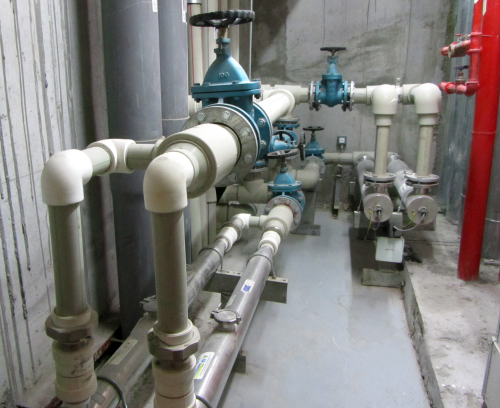
Novotel’s flagship Saigon Centre hotel in Ho Chi Minh City, Vietnam, has recently installed six Hanovia UV systems for service water treatment. The UV systems kill any microorganisms from the incoming city water supply, leaving it good enough to drink. All the UV systems provide a minimum 99.999% reduction in E.coli, Cryptosporidium, Giardia, Legionella and other harmful microorganisms. Tourism is a flourishing industry in Vietnam, with over a third of all visitors coming from Europe, where water quality is taken for granted. Currently, only 22% of hotel guests are Vietnamese, with 34% from Europe, 8.6% from North America and 9.5% from Oceania [1]. Having water of a drinking quality standard is therefore a high priority for the leading hotel chains operating in Vietnam. Microbial control in hotel and other building service water is a serious but easily overlooked problem. Hong Kong’s new government headquarters, for example, were recently contaminated by Legionella, which resides in buildings’ water cooling towers and pipes [2]. The same microbes were also found in other buildings in Hong Kong [3]. Most recently, three children at a Hong Kong school were infected by Staphylococcus aureus, a common water-borne bacteria. An update of the school’s water disinfection system is now required [4]. “Hotels across the Asia-Pacific region are now taking extra precautions to ensure their water meets the World Health Organisation’s drinking water quality guidelines and to ensure their guests’ health and safety,” commented Hanovia’s Asia Pacific Manager Ying Xu. “Even though hotel tap water is not intended for drinking purposes, UV provides that extra level of health and safety for residents in case they inadvertently drink the water, such as while brushing their teeth, or inhale water aerosol while showering. UV is in fact the WHO’s recommended disinfection method for Cryptosporidium and Giardia removal. It is already widely used to remove both microorganisms from water supplies in the European Union and United States. Water standards in Vietnam do not include Cryptosporidium and Giardia [5], but the Novotel chain sees the importance in conforming to the WHO’s standards,” she concluded. Traditionally, hotel water in Vietnam has been treated with chlorine. While this kills most microorganisms, it is ineffective against Cryptosporidium and Giardia, both of which are extremely hazardous to human health, causing severe diarrhoea, vomiting and fever, which can last for a month or more. Water treatment experts were unaware of the limitations of traditional chlorine disinfection until recent years. Chlorination can also affect the taste and smell of water if doses are too high. In this installation, six, single-lamp AF3 amalgam UV systems are installed on the hotel’s roof, treating water flows between 26.5 m3/h and 30 m3/h. City water passes through sand filters before storage in roof tanks, from where it passes through the UV systems prior to distribution to every room in the hotel. These UV systems are very small and can be installed in the tightest of places. A major advantage of using UV is its low operational cost. For example, 166 m3/h of water is treated at the hotel. As the six UV systems only consume 1.62 kW of power between them, for every 1m3 of treated water, the UV system consumes less than 0.01 kWh of power, which is approximately 0.1 US cents per m3. Commenting, Hanovia’s managing director John Ryan said: “This is yet another successful hotel project and reinforces our expertise as suppliers of UV technology that can be used across the board: from potable-standard water in hotel rooms to chloramine-free water in hotel pools and spas.”
References
[1] Grant Thornton (Vietnam) Ltd., Vietnam Hotel Survey 2012, P 7 [2] www.bbc.co.uk/news/world-asia-china-16388832 [3] www.news.gov.hk/en/categories/health/html/2012/10/20121009_143456.shtml [4] www.dh.gov.hk/chs/press/2012/121206-3.html [5] National technical regulation on drinking water quality. QCVN 01:2009/BYT [6] www.earthcheck.org/news/novotel-announces-global-shift-to-earthcheck.aspx




